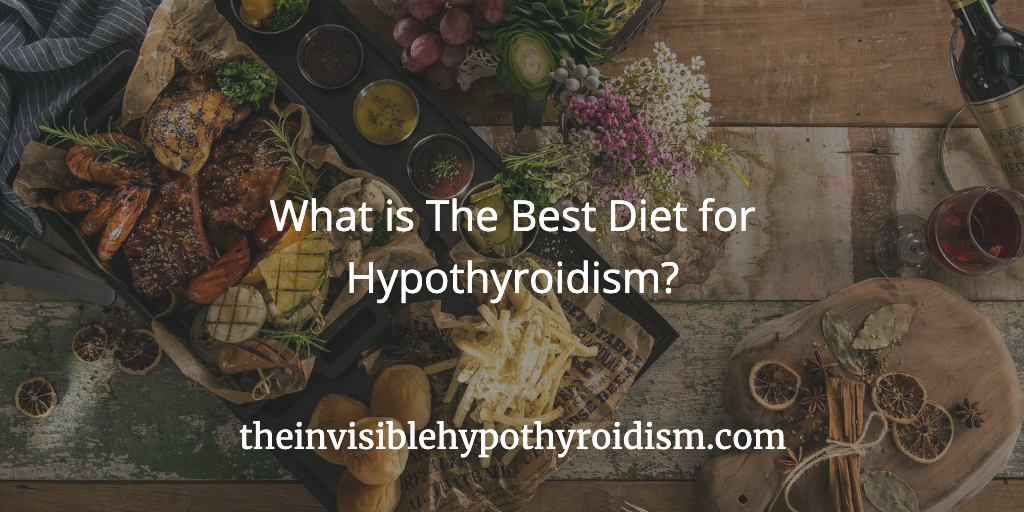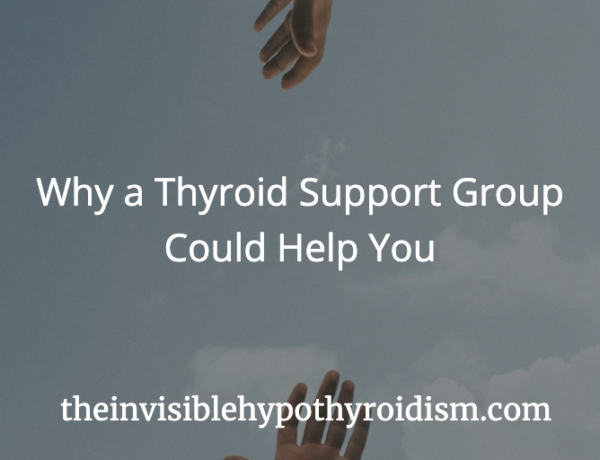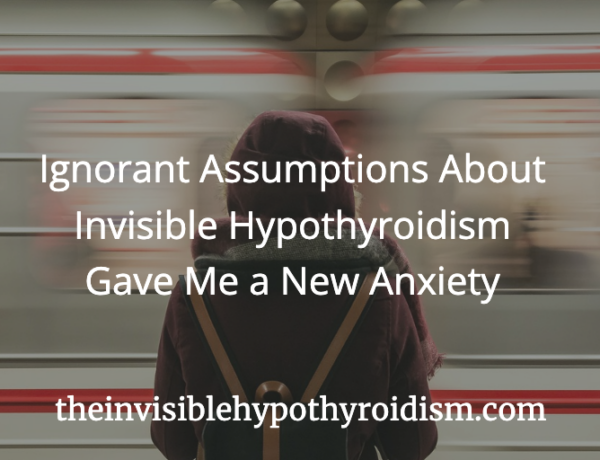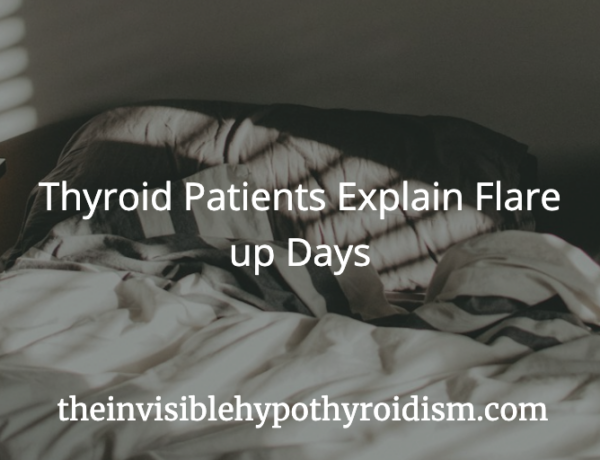Originally published on 5th April 2022 Last updated on 9th August 2024
One of the most common questions I am asked is:
What is The Best Diet for Hypothyroidism?
What I Mean By ‘Diet’.
Many people with hypothyroidism and Hashimoto’s are keen to know whether a change in their diet could yield reduced symptoms of fatigue, joint pain and indigestion, among many others.
It’s worth noting that I personally choose to avoid focusing on chasing weight loss as a thyroid advocate, so when I use the word ‘diet’, I am referring to the food that makes up what we eat day to day, and not a weight loss diet.
A result, I do not discuss or promote diets such as the ketogenic diet which is a low-carb, moderate protein, higher-fat diet designed to help you burn fat. I discuss dietary changes in regards to improving your health with hypothyroidism (that is, reducing thyroid symptoms and improving your quality of life).
And an important note: as someone who personally has a history of eating disorders / disordered eating myself, I am aware that the information in this article could be triggering if you’ve previously / are currently restricting foods. Do know that I will never suggest that any of us HAVE to cut out ANY food types, so I present this information for each of us to make that decision ourselves if we still have ongoing thyroid symptoms or are struggling to get it well-managed.
Some people may begin removing one or two foods from their diet and enter down a slippery slope in to disordered eating behaviours, so if this is you, and you start to feel anxious about food or much of your time and energy is preoccupied with this, please seek out support from a trained professional and be cautious about altering your diet. Disordered eating needs to be taken more seriously and I don’t wish to contribute to more people struggling with this.
Now, first and foremost, I have to make it clear that there is no magical diet that’s going to cure your hypothyroidism, no matter what you read online.
Secondly, when it comes to nutrition and what we eat, it’s important to be aware that what makes one person feel well or unwell, can have the opposite effect on another, and this is certainly true with thyroid patients, where some feel the benefit of removing certain types of food and others do not.
The short answer is: no one diet works best for everyone. We’re all different and often find that different things work for different people.
This is why I don’t promote one way of eating for all of us.
And remember: all of this plus all the other information you need to know as a thyroid patient is broken down and made easy to use in my bestselling book “Be Your Own Thyroid Advocate“. Make sure to utilise this!
What Diet Do I Follow?
Personally, I am gluten-free, alcohol-free (I have been since 2019) and limit my caffeine wherever I can, but that’s it. I focus on eating a balanced diet with lots of variety, keeping my blood sugar balanced as best I can.
I was also dairy-free for several months back in 2017, but saw no benefits, so returned to consuming dairy and am absolutely fine doing so.
However, other thyroid patients say they’ve found huge success in reducing thyroid symptoms by going:
- dairy free
- soy free
- grain free
- nightshade free
- AIP
- low FODMAP and more.
Intermittent fasting is also discussed in thyroid forums, but this alters when you eat and not what you eat. (and personally, I’m not a huge fan of intermittent fasting when I hear from the many thyroid patients who feel worse on it; seeing a drop in their thyroid hormone levels, rise in cortisol levels and Hashimoto’s antibodies shoot up)
There are plenty of different ways to eat out there and different dietary changes work for different people. This article will explore my belief that as we are all unique, we have to discover what personally works for us when it comes to diet, and also, what will and won’t add more stress to our plate when it comes to obsessing about food restrictions (which won’t help your health either).
Food Can Help or Hinder Your Health
I started saying this in 2018 when doing a Level 3 and Level 4 qualification in Diet and Nutrition.
I’m a total foodie. Cooking and baking new recipes is one of my favourite hobbies. I love trying new food and eating a real variety of cuisines.
I also have a history of disordered eating and unhealthy dieting, so I try to focus on eating well-balanced and in a way that makes me feel good. This means consuming most things in moderation, “eating the rainbow” and focusing on what helps or hinders thyroid symptoms and digestive complaints.
Do you notice a difference between how you feel and what you eat too?
A key example of this for me is what I eat for breakfast. If I skip breakfast or eat something lacking much substance and nutrition, I feel nauseas and have acid reflux. We can look at food and nutrition as another important part of that thyroid jigsaw puzzle.
Not having a high fibre breakfast for a couple of days brings on constipation for me. Missing protein from my meals and snacks gives me blood sugar imbalances (with dizziness, faintness, brain fog, mood swings and headaches). Eating gluten makes my thyroid condition harder to keep under control and leads to acne break outs.
Over the years, I become really in tune with what does and doesn’t make my body feel good since having a thyroid condition.
Why should we eat in a mindful way?
Eating well for your body (whatever that looks like) helps to maintain good gut health, which so many of us with thyroid disease also have issues with. It also helps to maintain crucial vitamin and mineral levels, which, if low can mimic thyroid symptoms such as fatigue, muscle pain and hair loss. And it can also help us to feel our best and keep thyroid flares at bay.
So Let’s Start With Widely Useful Foods
Overall, eating a nutrient dense diet is always going to be beneficial to thyroid patients in terms of supporting energy levels and optimum health.
Foods that contain zinc and selenium in particular can be useful, since they provide nutrients that support thyroid function.
Sources of selenium include:
- Meat – Chicken, Pork, Turkey, Beef
- Fish and shellfish
- Eggs
- Brazil nuts
Sources of zinc include:
- Meat – Red meat, poultry
- Oysters, Crab, lobster
- Dairy
- Nuts
- Beans
You may have also heard about consuming enough iodine. While it’s true that we need enough iodine to support thyroid function, excessive amounts can also be an issue. With iodised salt being readily available in most countries, most people will be getting enough from their diet as it is. If you consume a lot of seaweed for example, you could actually be taking in too much. A small intake of iodine at 150-220 mcg a day is usually safe and potentially helpful.
The omega-3 fatty acids found in fish such as wild salmon, trout, tuna, or sardines make these an excellent part of any hypothyroid patient’s diet too. Hypothyroidism can increase the risk for heart disease as a result of higher levels of LDL, the ‘bad’ cholesterol, so fish rich in omega 3 can lower the risk of heart disease. Fish can also be a good source of selenium, as mentioned above.
Like Omega-3, other healthy fats such as olive oil, butter and coconut oil help to keep cholesterol at healthy levels, in order to produce the hormones our bodies need. Coconut oil also reduces inflammation, raises body temperature and gives the body immediate, usable energy. These should be consumed in moderation, however.
As well as their zinc content, beans also contain a lot of protein, thus can be a great source of sustained energy, which, if you live with hypothyroidism, you may be lacking. They’re also high in fibre, which can be helpful if you suffer with constipation, a common symptom of hypothyroidism too. You can use them in stews, curries and salads.
Bone broth may support a healthy gut which in turn helps with nutrient absorption. Many people with hypothyroidism will also find themselves low in vitamins such as D, B12 or iron. Bone broths may also help with joint pain and support the immune system.
Fermented foods such as yogurt and kefir help to continuously stock your gut with beneficial bacteria, resulting in a stronger immune system and overall better health.
Cinnamon, ginger, garlic, peppermint, chamomile and turmeric are anti inflammatories, which may help to control your thyroid condition and promote better health.
Please note that some of the foods mentioned above may still cause undesirable responses in some people. More on this below where I cover elimination diets.

Foods You may Want To Avoid or Limit
When it comes to the types of food some thyroid patients find beneficial to remove from their diet, this can differ from person to person.
As I mentioned at the beginning of this article, our needs can differ a lot, so it’s up to each of us to listen to our body and figure out what is helping us to feel good and, conversely, not good. However, I will never label foods as ‘good’ or ‘bad’. Any foods mentioned here may or may not affect you, so you may find you don’t need to avoid them at all. Others may find their thyroid symptoms are reduced when they limit or avoid them. Approach with caution in that I don’t want to make anyone feel petrified about food.
Elimination Diets
An elimination diet can be useful when confirming which foods are perhaps hindering your ability to recover from thyroid symptoms.
The Elimination Provocation Diet (EPD) initially removes all and any foods which may be making your thyroid health worse, before adding them back in one by one and looking for noticeable responses to these foods.
Those wanting to try the EPD are generally advised to remove all potentially inflammatory foods from their diet for three weeks.
These include:
- Gluten
- Dairy
- Corn
- Eggs
- Nightshades
- Nuts
- Legumes
- Shellfish
- Citrus
- Soy
After three weeks of removing these, the reintroduction of each food type slowly begins. On a ‘reintroduction day’ you would choose one food type to reintroduce back in to your diet, eating around five servings in one day whilst monitoring symptoms over the next few days to determine if it needs to stay out of your diet for good.
Keeping a food diary can be incredibly helpful here. Symptoms of a food sensitivity may include fatigue, heartburn, indigestion, bloating, gas, muscle aches and pains, joint pain, skin issues, brain fog etc. but can be individual to you. The key here is to listen to your own body.
The foods from this list can then continue to be reintroduced into your diet one at a time, every few days, and signs of issues with these foods recorded.
As well as finding out which foods are making your health worse and removing these from your diet (either for good or just a few months before another attempt at reintroducing), it’s helpful to be aware of which other foods you should be eating in abundance and which you may want to be avoiding for optimal thyroid health. Again, take all this information and apply it to your own body and health.
Other Foods Which Can Make Thyroid Patients Feel Worse Include…
Soy, a goitrogen that blocks the activity of the TPO enzyme, which has therefore been linked to the development of autoimmune thyroiditis and hypothyroidism. Some thyroid patients therefore choose to avoid it or just ensure they’re not eating it in large amounts, however, soy can be great for our health, as it is high in protein and is a phytoestrogen that reduces risk of breast cancer and supports bone health. Newer research suggests soy doesn’t negatively impact thyroid function.
Studies show that there may be a link between absorption of levothyroxine and grapefruit juice, too, so ensure you eat the occasional grapefruit at least a few hours away from taking your thyroid medication.
For obvious reasons, sugar and processed foods can be limited to help with symptoms and overall health. They drive inflammation and disease, something we should be wary of when we have thyroid disease, and can make symptoms worse. They can also contribute to poor gut health (which is incredibly important to our overall health) and encourage blood sugar imbalances. We’re usually best to enjoy sugary and processed foods in moderation.
When it comes to goitrogenic foods, the general consensus is to eat them in moderation and that it seems they’re only goitrogenic in their raw state. Therefore, many suggest that cooking them adequately removes the goitrogens, or at least a large majority of them. For example, cooking goitrogenic vegetables like broccoli and sprouts until the ‘crunch’ has gone, can indicate that the goitrogens have also been eliminated. Whilst consuming fermented and cooked cruciferous vegetables is preferred, occasionally eating small
amounts of them raw should not aggravate thyroid conditions. The key is moderation really.
Goitrogenic foods include:
- Brassicas, e.g. brussell sprouts and cabbage
- Broccoli
- Bok Choy
- Bamboo shoots
- Cauliflower
- Cassava
- Canola Oil
- Choy sum
- Kale
- Mustard
- Radishes (Horseradish)
- Soy and soy milk (soy ‘anything’ really)
- Tofu
- Turnips
- Pine Nuts
- Peanuts
- Millet
- Peaches (mildly)
- Rapeseed
- Pears (mildly)
- Spinach (mildly)
- Strawberries (mildly)
- Sweet potatoes (mildly)
Keeping alcohol and caffeine consumption low can help, too. Both alcohol and caffeine can negatively impact your blood sugar. Blood sugar spikes cause cortisol to shoot up, which can tire out the adrenals and exacerbate hypoglycemia, Hashimoto’s and adrenal dysfunction.
Caffeine may also irritate the gut lining and encourage acid reflux, migraines, poor thyroid hormone conversion and something referred to as “oestrogen dominance”.
Many hypothyroidism and Hashimoto’s patients seemingly develop an intolerance or increased sensitivity to alcohol, too.
Alcohol can contribute to adrenal dysfunction also and deplete minerals and vitamins such as magnesium, zinc, folic acid, B Vitamins and Selenium. All of which are very important for thyroid health.
As always, if you wish to consume alcohol or caffeine, then do so in moderation and consider the overall effects on your health as well as your thyroid health specifically. If they contribute to you feeling worse, particularly in the form of a flare up of symptoms, consider whether it is best to avoid them in order to better manage your health.
In terms of dairy, many thyroid patients find that they have an issue with this. Removing dairy from your diet for a while to see if any symptoms improve can be worthwhile.
The thyroid symptoms a dairy sensitivity is often linked to include:
- Skin complaints such as acne and eczema
- Digestive complaints
- Brain fog
My husband was finally diagnosed in 2023 with lactose intolerance, after many years of suspecting it. It’s very likely that you’d know if you had lactose intolerance as symptoms can affect your day to day hugely.
As someone who has gone gluten-free and seen a lot of benefits, and as a gluten-free diet is the most cited to be helpful in those with a thyroid condition like hypothyroidism or Hashimoto’s, I focus mainly on this diet change when talking about my own experiences.
Why Gluten?
One theory we see a lot is that gluten is said to trigger the same autoimmune reactions that cause you to have Hashimoto’s in the first place, since the cells of your thyroid are similar to the make up of gluten, and it confuses the body, increasing inflammation, which can mean worse or extra symptoms. However, this theory (molecular mimicry) is yet to be conclusively proven or disproven.
Worsening thyroid hormone levels over time as well as swinging test results, are thought to typically be due to the ongoing destruction of your thyroid gland, which obviously causes it to not work properly (hypothyroidism). Lowering thyroid antibodies is believed to stop or slow this down, and going gluten-free seems ot help lower thyroid antibodies in some thyroid patients.
However, other reasons why thyroid patients may feel better on a gluten-free diet include:
- that eating naturally gluten-free usually means a reduction in processed, high sugar foods overall
- that a gluten sensitivity can lead to poor gut health, which can be indicated by a low absorption rate of minerals and vitamins. For example, low levels of B12, D, Iron etc.
When Italian researchers put subclinical or ‘borderline’ hypothyroid people with coeliac disease on a gluten-free diet for one year, thyroid function normalised in 71% of them, with another 19% normalising their thyroid antibodies. The researchers concluded that in some cases, a gluten-free diet may single-handedly reverse the abnormality. [1]
The Effect of Gluten-Free Diet on Thyroid Autoimmunity in Drug-Naive Women With Hashimoto’s Thyroiditis: A Pilot Study concluded that their results suggested a gluten-free diet may bring clinical benefits to women with Hashimoto’s. [2]
Consuming gluten can also lead to increased intestinal permeability (IIP), where the gut experiences things more easily passing through the gut lining. (Note: the gut is always ‘leaky’, so IIP refers to an increase in this)
If someone has increased intestinal permeability along with a gluten sensitivity, then the IIP allows small gluten particles to leak into the bloodstream, which may lead to symptoms of gluten sensitivity such as fatigue, brain fog, muscle aches, gut and stomach complaints etc.
In the case of molecular mimicry, it is theorised that the immune system then sees these particles as foreign entities and creates antibodies, mounting an attack not only on the foreign protein, gluten, but also on thyroid tissue.
However, there are huge benefits in screening for coeliac disease before removing gluten. For example, diagnostic tests for coeliac disease require you to be on a gluten-containing diet so that the test can detect any antibodies to gluten. If you are already on a gluten-free diet when tested for coeliac disease, you will need to reintroduce gluten for several weeks before the blood test, in order to get accurate results. Having a formal diagnosis of coeliac disease, if you have it, is also important.
Also, if coeliac disease is confirmed, as well as lifelong, strict gluten-free diet a longterm treatment plan will also need creating by your doctor and dietician to ensure you’re still getting the right nutrients from other foods. Monitoring of any intestinal damage and healing, as well as vitamin or mineral deficiencies is also recommended.
As of 2024, NICE Guidelines recommend that all autoimmune thyroid patients (those with Graves’ or Hashimoto’s) are screen for coeliac disease at diagnosis. Most people with hypothyroidism also have Hashimoto’s (as the cause) so this is important. Research shows that people with coeliac disease have a 1.5% to 3.8% chance of developing autoimmune thyroid disease, so there is a big correlation between the two conditions. If you test negative but develop possible symptoms at a later date, it is recommended you be screened again, as you can develop it at any time.
Balancing Blood Sugar
Symptoms of blood sugar issues can include headaches, feeling faint and dizzy, feeling hungry again soon after eating, feeling tired, grouchy, irritable and foggy minded.
One of the simplest things you can do to improve any thyroid symptoms you have is to learn how to keep your blood sugar well-balanced.
Healthy fats play a big role in our mental health, mood and brain function.
Good sources of fat include:
- Olive oil
- Sesame oil
- Avocados
- Olives
- Nuts
- Seeds
- Peanut butter (and other nut butters)
- Flaxseed
- Salmon
- Chia seeds
- Eggs
- Seed butter.
We can also help ourselves by ensuring we consume enough protein with every meal and snack, in order to keep blood sugar levels balanced.
Sources of protein can include:
- meats
- cheese
- eggs
- nuts
- seeds
- yoghurts
- beans and legumes.
We should aim to eat every two to three hours to keep blood sugar levels balanced, incorporating enough fats and protein with each meal and snack to keep us feeling better balanced. Going long times without food, such as fasting, can place extra stress on the adrenal glands. Never skip meals.
Conclusion on Diets…
While what you eat won’t cure your thyroid condition, it can help you feel better and reduce various thyroid symptoms. Starting with an elimination diet may be useful, as can increasing nutrient dense foods and ensuring you stay well-hydrated, too.
However, not everyone will feel better with dietary changes, so always approach with this in mind. I’m also not a fan of massively restrictive diets which can encourage disordered eating behaviours, and thus, create more stress which, in turn, isn’t great for our health either.
The best thing we can do is incorporate more variety and foods that help us to feel good, while removing or reducing anything that does the opposite, and staying mindful about avoiding over-restriction.
Related: Feeling Hungry All the Time Since Starting Thyroid Medication
Which, if any, diet has helped you in managing your thyroid health?
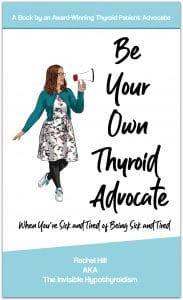
The book Be Your Own Thyroid Advocate: When You’re Sick and Tired of Being Sick and Tired, which builds on this article in detail and covers the ways in which you can take control of your thyroid health and symptoms to live a healthier, more vibrant life.
References:
[1] https://www.ncbi.nlm.nih.gov/pubmed/11280546
[2] https://www.thieme-connect.de/products/ejournals/pdf/10.1055/a-0653-7108.pdf

